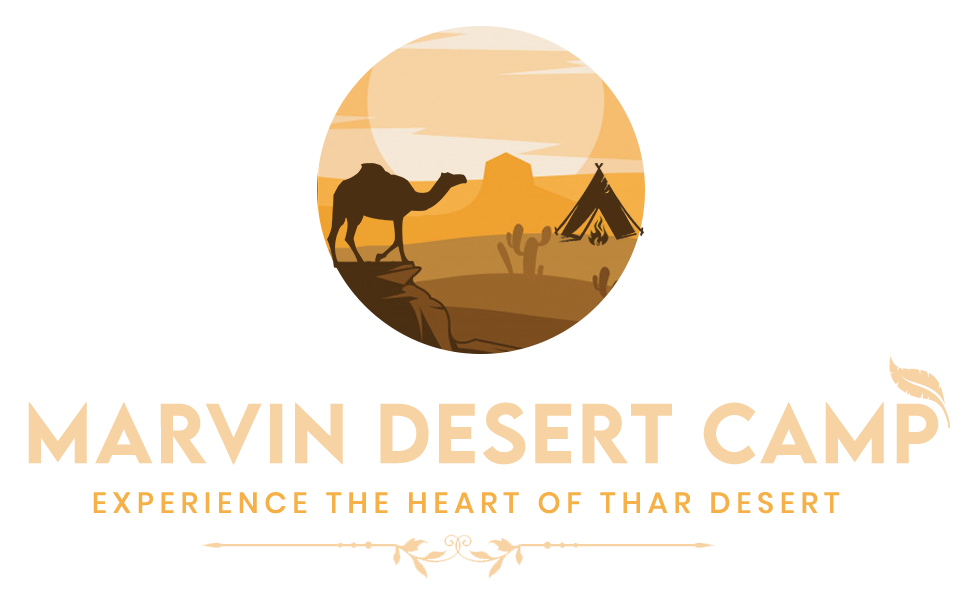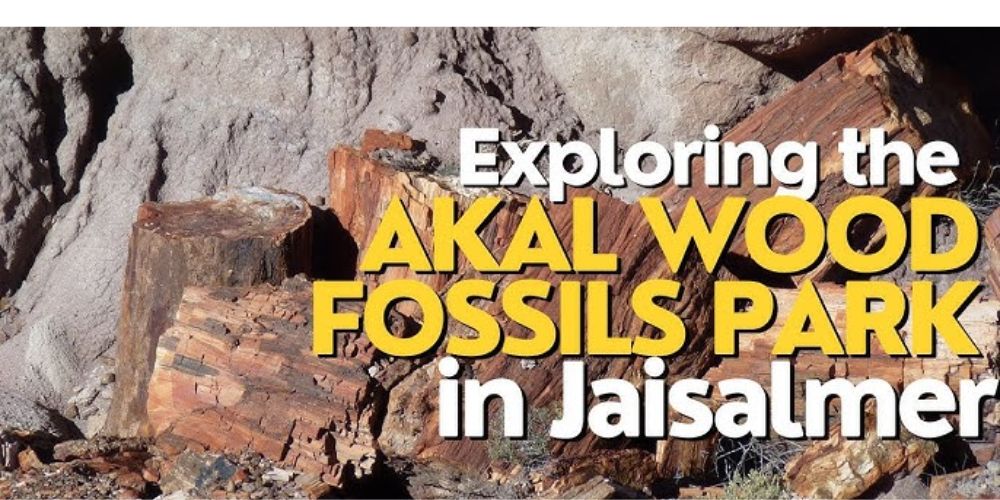Nestled in the vast expanse of the Thar Desert, the Akal Wood Fossil Park in Jaisalmer is a hidden gem that offers a glimpse into the ancient past of Rajasthan. Known for its fossilized wood, this park serves as an open-air museum showcasing the remains of trees that lived millions of years ago. The Akal Wood Fossil Park Jaisalmer is a testament to the power of nature and time, offering visitors a unique opportunity to connect with the ancient history of the desert.
History of Akal Wood Fossil Park
Located in Akal village, about 17–18 kilometers southeast of Jaisalmer city and just 1 kilometer off the NH-68 Jaisalmer-Barmer road, the Akal Wood Fossil Park spans an area of approximately 21 hectares. Nestled within a barren and rocky landscape covering around 10 square kilometers, the park sits in the heart of Jaisalmer’s fossil belt—an area of immense geological significance with high potential for establishing geological parks.
The fossil-rich terrain has yielded remarkable discoveries, including fossilized wood and ancient plant remnants from the Early Jurassic period, dating back nearly 180 million years. Among the notable finds are fossils of Pterophyllum, Ptilophyllum, Equisetites species, as well as dicotyledonous wood and gastropod shells. Additionally, around 25 petrified tree trunks are scattered across the park, the most prominent being 13.4 meters long and 0.9 meters wide. These fossilized logs lie horizontally, positioned randomly across the site.
Nearby areas such as Thaiyat have also revealed fossil footprints of pterosaurs, adding to the scientific and historical significance of the region.
Recognizing its importance, the Geological Survey of India (GSI) declared Akal Wood Fossil Park a National Geological Monument in 1972. The GSI initially managed the site until 1985, when maintenance responsibilities were transferred to the Forest Department of the Government of Rajasthan. Presently, the park is under the care of the Desert National Park authorities.
To preserve the ancient relics, the fossilized tree trunks are enclosed in iron grill cages with protective tin sheet roofing, ensuring that these natural treasures remain safeguarded for future generations and continue to educate visitors about Earth’s distant past.
What Makes the Akal Wood Fossil Park Jaisalmer Unique?
The Akal Wood Fossil Park Jaisalmer is not just a place of natural beauty but also a living testament to the geological wonders of the Thar Desert. Fossils found in the park date back to the Permian period, approximately 180 million years ago. Over time, these trees became fossilized, and their imprints are preserved in the form of petrified wood scattered across the park.
A visit to the Akal Wood Fossil Park Jaisalmer is like taking a journey back in time. The fossilized trunks and branches, which are now stone-like in texture, stand tall as a reminder of a world long gone. These fossils were once part of a lush tropical forest that existed in the region long before the desert landscape took shape. Today, the fossil park Jaisalmer offers not just a scientific exploration but also a sense of wonder as visitors walk among the ancient remains.
The Fossil Park Jaisalmer is an incredible example of natural preservation. While most of the region is barren and dry, the fossilized trees stand as proof of the Thar Desert’s rich, ancient history. The park is an excellent destination for those interested in paleontology, geology, or simply the marvels of nature. Whether you’re planning Jaisalmer sightseeing tours or looking for a desert adventure, the Akal Wood Fossil Park Jaisalmer should be high on your list of must-visit places.
The Beauty and Significance of Fossilized Trees at Akal Wood Fossil Park
The fossilized trees at the Akal Wood Fossil Park Jaisalmer are some of the most well-preserved specimens in the world. These trees, now transformed into fossils, are a unique spectacle that reflects the process of petrification, where organic materials are slowly replaced by minerals, preserving their structure. The wood fossil park Jaisalmer offers an insight into the ancient ecosystem of the region, where tropical vegetation once thrived.
Walking through the fossil park Jaisalmer, visitors can observe the various sizes and shapes of the fossilized trunks and logs, some of which are several feet long. The park is well-maintained, and informative sign boards provide details about the history of the fossils, their age, and the geological processes that led to their preservation. As you explore the fossil park Jaisalmer, you’ll be transported into a prehistoric world, one that existed long before the modern desert environment took shape.
In addition to the fossilized wood, the Akal Wood Fossil Park Jaisalmer is also home to a variety of desert plants and animals, offering a contrast between the ancient past and the vibrant life of the Thar Desert today. The park is a living example of how nature has evolved over millions of years.
Akal Wood Fossil Park: A Step into Prehistoric Times
The Akal Wood Fossil Park Jaisalmer is not just about fossils; it’s about understanding the history of life on Earth. Fossils are the key to understanding how life forms evolved over time, and the wood fossil park Jaisalmer serves as a treasure trove for paleontologists and history enthusiasts. The fossils found in the park are evidence of the lush, green environment that existed in the area millions of years ago when it was part of a vast tropical forest. As the desert slowly overtook the region, these trees were buried and eventually turned into fossils, preserving them for future generations to discover.
The fossil park Jaisalmer is an important archaeological site that draws visitors from all over the world. It’s one of the few places in India where such large and well-preserved tree fossils can be found. The Akal Wood Fossil Park Jaisalmer is a perfect example of how natural history can offer a glimpse into the distant past. Visiting this park is an educational experience that teaches you not only about the history of life on Earth but also about the unique geography and climate of the Thar Desert.
For those on Jaisalmer sightseeing tours, the Akal Wood Fossil Park offers a chance to explore a different side of the desert. It’s a rare opportunity to see the ancient remnants of a world that existed long before the sand dunes of the Desert Camp In Jaisalmer were formed. Whether you’re a nature lover, a history buff, or simply curious about the ancient past, the Akal Wood Fossil Park Jaisalmer offers something for everyone.
Best Time to Visit the Fossil Park Jaisalmer
When planning a visit to the Akal Wood Fossil Park Jaisalmer, timing is everything. The best time to visit the park is between October and March when the weather in Jaisalmer is cooler and more comfortable for outdoor exploration. The harsh summer heat can make it difficult to enjoy the park, but during the winter months, the desert cools down, and the park becomes an ideal place for sightseeing.
As you plan your visit to the fossil park Jaisalmer, be sure to check the Akal Wood Fossil Park entry fee, which is affordable and worth the experience. The park is open year-round, but the cooler months offer the best conditions for exploring the fascinating fossilized wood and learning about the region’s geological history.
Exploring the Surrounding Areas
While in Jaisalmer, visitors often make time to explore other attractions in the region. One such place is located around 70 kilometers away from Jaisalmer. This park is known for its wildlife and offers a unique opportunity to experience desert flora and fauna. This varies depending on the season, but it is typically open from sunrise to sunset. The park is a great place to see desert animals in their natural habitat, including antelopes, wild boars, and birds.
For those interested in wildlife and nature, combining a visit to the Akal Wood Fossil Park Jaisalmer with a trip tocan make for an unforgettable experience. Both parks provide a unique opportunity to experience the natural beauty of Rajasthan, one through the lens of prehistoric life and the other through the thriving wildlife of the desert.
Akal Wood Fossil Park Entry Fee and Other Practical Information
When planning your trip to the Akal Wood Fossil Park Jaisalmer, it’s important to know the details of the entry fee and the park’s visiting hours. The Akal Wood Fossil Park entry fee is minimal, making it an affordable stop for travelers. Visitors can easily explore the park on their own or opt for a guided tour to learn more about the fossils and the history of the area. The park is well-signposted, and you can find brochures and information boards throughout the site to enhance your visit.
For a more comprehensive tour of Jaisalmer, you can also explore the nearby attractions as part of a Jaisalmer sightseeing tour. From the majestic Jaisalmer Fort to the stunning Patwon Ki Haveli, the city offers a wealth of historical and cultural treasures. However, the Akal Wood Fossil Park Jaisalmer stands out as one of the most unique and fascinating sites in the area, providing a deep connection to the ancient past of the Thar Desert.
Conclusion
The Akal Wood Fossil Park Jaisalmer is one of those rare and unforgettable places that leave a lasting impression on every visitor. Whether you’re a nature enthusiast, a history lover, or simply someone looking for a unique experience in Rajasthan, this fossil park is a must-visit. The fossil park Jaisalmer offers a glimpse into a prehistoric world, where the desert once teemed with lush, tropical vegetation. Today, these ancient remains stand as a testament to the power of nature and the passage of time.
As you plan your trip to Jaisalmer, make sure to include a visit to the Akal Wood Fossil Park in your itinerary. It’s not only a fascinating stop on your journey but also a reminder of the ever-changing landscape of the Thar Desert. Whether you’re exploring the fossilized wood, learning about the park’s history, or simply enjoying the serene desert environment, the Akal Wood Fossil Park Jaisalmer is a place you won’t want to miss.
For a complete Jaisalmer experience, consider pairing your visit to the fossil park with a Jaisalmer sightseeing tour or a desert adventure. Together, these experiences will give you a deeper understanding of the history, culture, and natural beauty of this incredible region.
FAQS
What is Akal Wood Fossil Park Jaisalmer known for?
Akal Wood Fossil Park Jaisalmer is known for its collection of petrified tree fossils, dating back over 180 million years, showcasing the prehistoric vegetation of the region.
Where is Akal Wood Fossil Park Jaisalmer located?
Akal Wood Fossil Park Jaisalmer is located about 17 kilometers from the city of Jaisalmer, in the heart of the Thar Desert in Rajasthan, India.
What can visitors see at the Fossil Park Jaisalmer?
Visitors can see fossilized tree trunks and branches scattered across the park, along with informative displays explaining the park’s geological history.
What is the Akal Wood Fossil Park entry fee?
The Akal Wood Fossil Park entry fee is nominal, making it an affordable destination for tourists interested in nature and paleontology.
Why is the Wood Fossil Park Jaisalmer significant?
The Wood Fossil Park Jaisalmer is significant because it preserves evidence of a tropical forest that existed millions of years ago, revealing insights into Earth’s ancient ecosystems.
Is Akal Wood Fossil Park Jaisalmer suitable for all age groups?
Yes, Akal Wood Fossil Park Jaisalmer is an educational and family-friendly destination suitable for visitors of all age groups.

